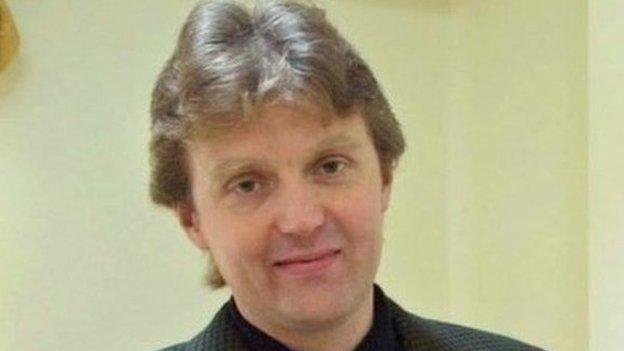Litvinenko inquiry: Key suspect Kovtun to give evidence
- Published

In March Mr Kovtun changed his mind and said he would be willing to take part in the inquiry
One of the key suspects in the killing of ex-Russian spy Alexander Litvinenko is to give evidence at the inquiry into his death, it has been confirmed.
Ex-Soviet army officer Dmitri Kovtun will appear by video-link after he was granted "core participant status" by inquiry chairman, Sir Robert Owen.
Mr Litvinenko died of radioactive poisoning on 23 November 2006.
Mr Kovtun and Andrei Lugovoi are suspected of murdering him but both deny involvement and remain in Russia.
It was during a meeting with the pair at a London hotel in November 2006 that Mr Litvinenko drank tea containing a fatal dose of the radioactive substance polonium-210.
The 43-year-old had been an officer with the Federal Security Service - the successor to the KGB - but fled to Britain where he became a UK citizen and a fierce critic of the Kremlin.
Inquiry chair 'satisfied'
Mr Kovtun and his colleague Mr Lugovoi initially refused to take part in the inquiry, which opened in January and is sitting at the Royal Courts of Justice in London.
However, in March Mr Kovtun changed his mind and offered to give evidence.
A statement issued by the inquiry on Monday said: "Sir Robert Owen, chairman of the Litvinenko Inquiry, has designated Mr Dmitri Kovtun as a core participant to the Inquiry, pursuant to rules 5(2)(a) and (c) of the Inquiry Rules 2006.
"Sir Robert is satisfied that Mr Kovtun has complied in full with his directions dated 2 April 2015."
The statement also said that Mr Kovtun "does intend to assert the privilege against self-incrimination".

Mr Litvinenko died three weeks after drinking tea laced with polonium-210

The Litvinenko case
23 Nov 2006 - Mr Litvinenko dies three weeks after having tea with former agents Andrei Lugovoi and Dmitri Kovtun in London
24 Nov 2006 - His death is attributed to polonium-210
22 May 2007 - Britain's director of public prosecutions decides Mr Lugovoi should be charged with the murder of Mr Litvinenko
31 May 2007 - Mr Lugovoi denies any involvement in his death but says Mr Litvinenko was a British spy
5 Jul 2007 - Russia officially refuses to extradite Mr Lugovoi, saying its constitution does not allow it
May-June 2013 - Inquest into Mr Litvinenko's death delayed as coroner decides a public inquiry would be preferable, as it would be able to hear some evidence in secret
July 2013 - Ministers rule out public inquiry
Jan 2014 - Marina Litvinenko in High Court fight to force a public inquiry
11 Feb 2014 - High Court says the Home Office had been wrong to rule out an inquiry before the outcome of an inquest
July 2014 - Public inquiry announced by Home Office

- Published30 March 2015
